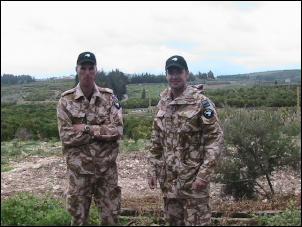Lebanon: NZ of Clearing Cluster Bombs Appreciated
Letter from Lebanon: NZ Work Clearing Cluster Bombs Much Appreciated

*******
(BEIRUT – 20 March 2007) – The New Zealand Explosive Ordnance Disposal (EOD) team knows just how much their work clearing agricultural land of cluster bombs is appreciated by local farmers. Little more than a week after they began work in southern Lebanon, near Tyre, local workers were already back to ploughing. Paul Mead, Officer in Charge of the Battle Area Clearance (BAC) team, laughs that the locals insisted on going out ‘the very next day’ after it was declared safe from unexploded munitions. The contamination of land by cluster bombs impacts upon the livelihoods of land owners, land users and workers.
The Kiwi team was deployed to Lebanon on 9 February 9. By 23 February they were out in the field, granted accreditation by the United Nations Mine Action Co-ordination Centre in Southern Lebanon (UN-MACC-SL). UN-MACC-SL is the body which overseas the many teams from around the world involved in the massive project. The unusually short accreditation period, ‘after just 12 days in theatre,’ is testimony to the ‘excellent’ training received back in New Zealand, says team leader Lieutenant Commander Steve Lenik.
MACC spokesperson Dalya Farran points out that it is ‘a first for a government to provide’ a military team, directly to UN-MACC-SL. Most governments provide troops through the United Nations Interim Force in Lebanon (UNIFIL)
According to Lenik, the New Zealand Government has made this decision because we have no NGOs with demining expertise. It has committed two teams of 10 personal for a period of six months each. Both New Zealand Defence Force contingents include three Navy Operational Divers, specialised in search and clearance, and six New Zealand Army Engineers who take care of disposal.
They have completely cleared 30,807 square metres to date. This area includes land planted with citrus trees, some ploughed land and tobacco plants. Next on the list, the team is moving across the road to a banana plantation. Because of the softer ground, banana plantations are more difficult to decontaminate. The team will need to use a metal detector, which they have not needed up until now.
In fact the Lebanese Armed Forces (LAF) had already been called to the site to remove unexploded munitions by locals for a total of six demolitions. However, says Mead, it seems that some of these demolitions were incorrectly carried out.
‘Because of insufficient explosives’, the officer explains, some of the cluster bomb fragments were not detonated and were merely sent flying by the attempt to destroy them. So they remain a potentially deadly threat. Lenik adds that the LAF were working in the immediate aftermath of the July-August 2006 War, and so resources were spread extremely thin at the time.
So far, the crew has turned up 11 M85 Cluster Box Units, 14 M85 fuses and one bomb fuse. The clearance process is painstaking and the team progresses metre by metre. They try to locate where the bomb or munitions were initially dropped by finding the crater and working outwards to find the surrounding undetonated explosives.
This is made problematic and potentially dangerous, says Farran, by the absence of information provided by the Israeli Defence Force (IDF).
All information on the Kiwis’ progress is plotted by MACC in its central database, IMSMA-GIS. MACC uses this database to produce maps, do planning and set priorities. When the New Zealand team has completed its present assignment, MACC will decide on their next site. Houses, schools and hospitals were urgently cleared first. Now agricultural sites are determined according to crop cycles.
There are currently 54 such teams operating under the guidance and supervision of UN-MACC-SL, soon to be 61. And MACC needs all the hands it can get. As Farran explains, the high density of cluster bombs in southern Lebanon, an area where virtually all land is inhabited or used for agriculture, makes the humanitarian hazard severe. The MACC spokesperson stresses that in these terms, the cluster bomb problem here is ‘the worst in modern history. It’s unprecedented.’
Yasmine Ryan is a graduate of the University of Auckland, in Political Studies and French language. She is currently interning with a Lebanese newspaper in Beirut, as part of her Masters degree in International Journalism at the Institut d’Etudes Politiques, Aix-en-Provence.
ENDS


 Binoy Kampmark: Condemning The Right To Self-Defence - Iran’s Retaliation And Israel’s Privilege
Binoy Kampmark: Condemning The Right To Self-Defence - Iran’s Retaliation And Israel’s Privilege Gordon Campbell: On The Making Of King Donald
Gordon Campbell: On The Making Of King Donald Binoy Kampmark: Rogue States And Thought Crimes - Israel Strikes Iran
Binoy Kampmark: Rogue States And Thought Crimes - Israel Strikes Iran Eugene Doyle: The West’s War On Iran
Eugene Doyle: The West’s War On Iran Richard S. Ehrlich: Deadly Border Feud Between Thailand & Cambodia
Richard S. Ehrlich: Deadly Border Feud Between Thailand & Cambodia Gordon Campbell: On Free Speech And Anti-Semitism
Gordon Campbell: On Free Speech And Anti-Semitism